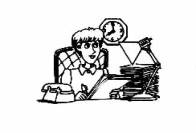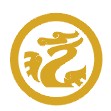
Unit 7 Can I See Your Manager?
第七单元 我能见你们经理吗?
导 读
通过这一课的对话Can I see your manager? 、Let me check…短文A receptionist’s job和一些相应的练习我们要了解receptionist接待员的工作并学习相应的表达法;语法我们讲There be结构。
译 文
对话一 我可以见你们经理吗?
一位来访者想约见副经理,秘书正在和他打招呼。
接待员:早上好。请问您有什么事吗?
来访者:是的,我想见见陈副经理。
接待员:请问您的姓名?
来访者:沃尔士公司的乔治史密斯。
接待员:谢谢,史密斯先生。让我看看他是不是有空。请稍等一下… 恐怕陈先生这会儿没空。您愿意等吗?
来访者:那么,要等多久呢?
接待员:大约一个小时。
来访者:噢,那太久了。我11点钟有个会。
接待员:您愿意再约个时间吗?
来访者:好吧,只好这样。星期五上午9点半,好吗?
接待员:好的,我记一下。我会请他确认的。他有您的电话号码吗?
来访者:是的,他有。
接待员:好的,史密斯先生,我们周五见。
来访者:好,谢谢,再见。
接待员:再见。
对话二 让我查一下
接待员正在安排经理和客人的会面时间。
接待员:下午好。请问您有什么事吗?
来访者:是的。我可以见见你们的生产部经理洛森先生吗?
接待员:对不起,洛森先生今天出去办事了。
来访者:那么,我想约个时间下周和洛森先生见面。
接待员:让我查一下他的时间安排。请稍等,很快的… 有了,洛森先生星斯二上午、星期三上午和星期五上午看
来有空。
来访者:请给我约星期三下午好吗?
接待员:两点半可以吗?
来访者:好的。
接待员:我记一下。要我确认后给你回话吗?
来访者:好的。这是我的名片,你可以随时和我联系。
接待员:好的,我会的。
来访者:非常感谢,再见。
接待员:再见。
短文 接待员的工作
接待员就是做接待工作的秘书。接待员也有多种。在小公司,接待员得做接待、打字等办公室工作;而在大公司,接待员只负责接待客人、预约时间、安排旅行等事宜。
接待工作也有不同方面。经理应该把自己所有的工作约会都通知接待员。这件事应在事先或在每天一开始上班就做好。他们应告知接待员他们全天的活动安排 (例如,去见某一位重要人物,去吃午饭)。如果接待员事先了解这些情况,她就能在接待客人时及时与他们商谈有关事宜,不至延误,从而高效地工作。
Main points of the text
Dialogue A
1. Let me see if he is available.
if是连词,在此句里意为“是否”,相当于whether, 多用于口语;上一课passage中if you mention it first里的if意为“如果”。
available 意为“(事物)可获得的;(人)能出席的”。
eg. The book you ordered is not available. 你订购的那本书没有货。
2. Would you mind waiting?
mind 后面要接名词、动名词、名词性词组或从句,还要注意答话。
eg. 1) Would you mind turning down the TV? 你把电视关小点声好吗?
2) — Would you mind my smocking? — 您介意我吸烟吗?
— No, go ahead, please. // Yes, I do mind. — 没关系,请吧。// 是的,我确实介意。
3. Well, how long will it be?
Well是语气词,没有实在意义,不同于具有形容词或副词词性的well“好”。
How long will it be? 是一般将来时。It指visitor可能要等待的时间。Will后面要跟动词原形,所以用be而不用is。
4. I’ll also ask him to confirm.
ask sb. to do sth. 请某人做某事
Dialogue B
1. Mr. Lawson doesn’t seem to be busy on Tuesday morning
seem 是连系动词,后跟表语, to be可以省略。
eg. Lesson One seems more difficult than Lesson Two. 第一课似乎比第二课难。
日期前面介词用on。
2. Would 2: 30 be convenient?
口语里用would比will客气。同样, 用could比can客气。如果用Would/Could you please …? 就更客气了。
Passage
1. Secretaries (who receive visitors) || are called receptionists.
双竖线前面的部分是句子的主语,其中含有who引导的定语从句。汉译时定语从句一般要先翻译句子才顺畅。
are called是被动语态。被动语态由be + v. 的过去分词构成,表示某事被做。
2. In a small firm, the “receptionist” may have to receive visitors and do some typewriting and clerical work.
do some typewriting 打打字
do some doing 是常用的词组,可以套不同的动作。
3. In a large firm, on the other hand, a receptionist only receives visitors and makes appointments and travel arrangements.
and是连词,两边的语法结构要平衡一致,如receives和 makes(同为动词第三人称单数形式);appointments和travel arrangements(同为名词,做make的宾语)。同时,and后面常常会省略与前面相同的部分,如第一个and后面的a receptionist only和第二个and 后面的makes。
4. This should be done in advance or at the beginning of each day.
should是情态动词,后面要跟动词原形,所以被动语态be done中的be用原形;or 也是和and一样的连词,两边结构为并列关系。
5. They should inform the receptionist of their activities (for example, going to see an important person, going to lunch) throughout the day.
for example/instance 意为“例如”,两边都用逗号。
“去看望重要的人”和“去吃午饭”都属于executives 的activities,应为名词,故将动词改作动名词。
6. (If the receptionist has this information), she can receive and talk to visitors without any delay, and she can work efficiently.
if是连词,意为“如果”,引导条件状语从句。can是情态动词,后面要跟动词原形。work是动词,故用副词(efficiently)来修饰。
More practice of the text
1 One of the four underlined parts in each sentence below is wrong. Find the mistake and correct it. 找出四个划线部分中错的一个并改错
( ) 1. He have to fill in many forms to apply for a passport and a visa to go abroad.
A B C D
要想申请护照和签证出国他得填很多表。
( ) 2. There is many yoghurt (酸奶) in the jar (广口瓶).
A B C D
( ) 3. Do your mother do some shopping in the supermarket nearby (在附近的) on Sunday?
A B C D
( ) 4. Do you mind my introduce a new comer to the staff(全体职员)?
A B C D
( ) 5. Some of the children are playing the electronic organs(电子琴), the others is sing a Christmas(圣诞节) song.
A B C D
2 Make a dialogue according to the following situation.
Suppose (假设) you are the receptionist of a company. A visitor wants to see your president, but he is not available. The visitor can’t afford to wait (等不及). You check your president’s diary and make an appointment for the two for some other time and promise (答应) to confirm (确认) the appointment.
Key:
1.
2.
(Open)
Helping you with the exercises
1 Answer the following questions according to the dialogues.
Key:
1. He is the vice-president
2. No he can’t. Because he is occupied/busy // is not free at the moment.
3. Yes, he does.
4. Friday morning at 9;30
5. He is the production manager.
6. Because he is out on business.
7. Wednesday afternoon at 2:30.
2 Answer the following questions according to the passage.
Key:
1. They are secretaries who receive visitors.
2. In a small firm, he/she may receive visitors and do some typewriting and clerical work.
3. In a large firm, a receptionist may only receive visitors and make appointments and travel arrangements.
4. To help the receptionist work efficiently.
3 The following is a summary of the patterns and expressions used in receiving visitors. Read them carefully and try to remember them by heart.
1. The manager wants to know if your business is urgent. 经理想知道您的事急不急。
2. Can I ask what you wish to see him about?
I’m told to get that information from every caller. 老板吩咐我向每位来访者了解这个情况。
3. go right in 直接进去。
4. have a seat (sit down)
Would you please leave your card 请留下您的名片?
4 Give a warm reception to the visitor the visitor on behalf of your company.
请代表你的公司热情接待这位来访者(参考课文和练习三中的表达法)
Key:
1. Can help you? // What can I do for you? // Is there anything I can do for you?
2. May I have you name, please?
3. Would you please have a seat and wait for a moment?
4. Mr. Gorge Smith of Walsh Company is here for his appointment.
5. Mr. Gorge Smith is expecting you, Mr Smith. Please go right in.
6. You’re welcome. // My pleasure. // …
5 Match the explanations in Column B with words and expressions in Column A.
Key:
1. g 2. e 3. f 4. a 5. b 6. c 7. d
6 Translate the following sentences into English.
Key:
1. Can I help you?
2. May I have your name, please?
3. Let me see if he is available.
4. Mr Chen is occupied at the moment.
5. Would you please have a seat and wait for a moment?
7 Read the passage carefully and then answer the following questions that follow.
Key:
1. He/She should offer him a seat, and promise to contact the person he wishes to see.
2. A visiting card tells you the visitor’s name, title and his company.
3. He/She should note the visitor’s name, the date and time and his firm.
4. He/She should offer the visitor some reading materials.
5. He/She should give some explanation and apologize for the delay.
Grammar Focus
“There be” 表示客观存在的“有”
Practice your grammar
1 Fill in the blanks with is or are.
Key:
1. is 2. Are 3. is 4. Is, is 5. is (如果题目未要求必须用is 或are,可以填will be,这是一般将来时) 6. Is, is 7. is 8. is (或will be,理由同第5题)
2 Turn the following statements into questions and then give both the yes and no answers to them. 把下列句子变成一般疑问句并做肯定和否定回答。
Key:
1. Are there any visitors in the city? Yes, there are. // No, there aren’t.
2. Is there a map of China in the room? Yes, there is. // No, there isn’t.
3. Are there any new words in the dialogue? Yes, there are. // No, there aren’t.
4. Is a there clock on the wall? Yes, there is. // No, there isn’t.
5. Is there a new book in his bag? Yes, there is. // No, there isn’t.
6. Are there any students from Beijing in our class? Yes, there are. // No, there aren’t.
7. Will there be more students in the school next year? Yes, there will. No, there won’t/will not.
8. Will there be a meeting this afternoon? Yes, there will. No, there won’t/will not.
Merry Learning
内容详见多媒体配套光盘。
Listening In and Speaking Out
1 Conversations
Listen to the conversations and choose the best answers to complete the statements.
1. The man is looking for ____.
a. a letter b. A dictionary c. His money (钱) d. A book
2.____ can speak English.
a.The man b. The woman c. Both of them d. Neither of them
3.____ The plane will arrive at ____.
a. 6:10 a.m.(早晨上午) b. 10:06 a.m. c. 6:10 p.m.(下午, 晚上) d. 10:06 p.m.
4.____ is a secretary.
a. Mr. Green b. Mrs. Green c. Mr. White d. Mrs. White
5.____ will attend the ten o’clock meeting.
a. The man b. The woman c. Henry Jones d. Peter Jones
2 Passage
Listen to the passage and then decide whether the following statements are true (T) or false (F).
( ) 1.Tom is short.
( ) 2. Tom plays well.
( ) 3. Peter always loses.
( ) 4. Peter doesn’t like playing with Tom.
3 Spot Dictation
Listen to the short passage and fill in the blanks with the missing words.
I have to go to Beijing for a ____ next Thursday. I want to get there by nine o’clock a.m. And I will ____ to Tianjin on an evening train. The train ____ Beijing at about eight o’clock. Please look up this ____ in the Rail Guide and book ____ for me.

4 Picture Identification
Listen to the six statements and decide whether the statements are true (T) or false (F).
1. 2. 3. 4. 5. 6.




















